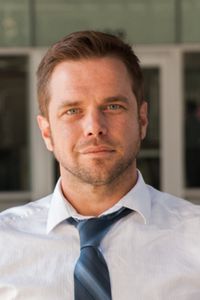Jon-Robert McDowell
Jon-Robert McDowell ran for election to the Chicago City Council to represent Ward 46 in Illinois. McDowell lost in the general election on February 26, 2019.
McDowell completed Ballotpedia's Candidate Connection survey in 2019. Click here to read the survey answers.
McDowell responded to Ballotpedia's unique candidate survey for 2019 Chicago candidates. The survey questions were developed with input from more than 100 Chicagoans in the months preceding the 2019 election. Here is one selected response:
"The pension crisis and the debt it has caused is the most pressing and controversial issue we face as a city, and the one most incumbents and candidates wish they never had to talk about, but that is exactly why it needs to be addressed. It has essentially bankrupted our state and our city is in no better shape."
Click here to read more of McDowell's responses.
Elections
2019
See also: City elections in Chicago, Illinois (2019)
General runoff election
General runoff election for Chicago City Council Ward 46
Incumbent James Cappleman defeated Marianne Lalonde in the general runoff election for Chicago City Council Ward 46 on April 2, 2019.
Candidate | % | Votes | ||
| ✔ |  | James Cappleman (Nonpartisan) | 50.1 | 7,079 |
 | Marianne Lalonde (Nonpartisan)  | 49.9 | 7,054 | |
| Total votes: 14,133 | ||||
 = candidate completed the Ballotpedia Candidate Connection survey. = candidate completed the Ballotpedia Candidate Connection survey. | ||||
| If you are a candidate and would like to tell readers and voters more about why they should vote for you, complete the Ballotpedia Candidate Connection Survey. | ||||
Do you want a spreadsheet of this type of data? Contact our sales team. | ||||
General election
General election for Chicago City Council Ward 46
The following candidates ran in the general election for Chicago City Council Ward 46 on February 26, 2019.
Candidate | % | Votes | ||
| ✔ |  | James Cappleman (Nonpartisan) | 44.1 | 6,082 |
| ✔ |  | Marianne Lalonde (Nonpartisan)  | 18.1 | 2,494 |
 | Erika Wozniak Francis (Nonpartisan)  | 16.8 | 2,324 | |
Angela Clay (Nonpartisan)  | 15.4 | 2,127 | ||
 | Justin Kreindler (Nonpartisan) | 3.9 | 545 | |
 | Jon-Robert McDowell (Nonpartisan)  | 1.7 | 229 | |
| Total votes: 13,801 | ||||
 = candidate completed the Ballotpedia Candidate Connection survey. = candidate completed the Ballotpedia Candidate Connection survey. | ||||
| If you are a candidate and would like to tell readers and voters more about why they should vote for you, complete the Ballotpedia Candidate Connection Survey. | ||||
Do you want a spreadsheet of this type of data? Contact our sales team. | ||||
Campaign themes
2019
Ballotpedia survey responses
See also: Chicago 2019 Candidate Survey
Jon-Robert McDowell completed Ballotpedia's Chicago candidates survey for 2019. The survey questions appear in bold and are followed by McDowell's responses.
Do you believe that there is corruption in Chicago politics, such as pay-to-play practices when the city awards bids? If so, how would you address it?
We need serious campaign finance reform in the city of Chicago to ensure that our elected officials are accountable to the people they represent and not monied interests. The pay to play system in our city is rampant, as developers in particular use this system to curry favor in zoning changes and allotments. But, that is just the beginning. We also need to put a ban inter-council donations. When the Mayor can donate money to an Alderman, that is not support, that is bribery - plain and simple. Lastly, we must restore the caps on donations from personal relatives. If an individual wants to give to a campaign they support, they are limited, however if that candidates wealthy parents wish to donate, the sky is the limit. We did away with monarchies and dynasties long ago, and did so for a very good reason.
How would you handle the “recurrence of unaddressed racially discriminatory conduct by officers” identified in the U.S. Justice Department’s investigative report of the Chicago PD published in 2017?
The report from the U.S. Justice Department says it all, “poor training, too quick to use excessive and often deadly force, lax discipline, and lack of consequences for excess attacks on Blacks and Latinos.” The result is an overwhelming lack of trust in our police force by members of our communities and a police force that reacts to that lack of trust with only more force. This continues to erode the trust we have in our men and woman in blue. It is time we rebuilt the trust between our communities and the police, all while making our streets safe again. When we empower and reward effective and law-abiding officers through proper funding, educational resources, and multicultural encouragement, we become our own protectors. Law enforcement must be part of the community, invested in the result of their hard and difficult work. Create beat integrity, by urging officers to build relationships within their community. Officers are charged with public safety and that can only be achieved if they’re familiar with the community they serve and they understand its needs. Reward for community engagement and reduction in crime rates, focusing on the protection of their neighborhood instead of generating revenue through superfluous ticketing. Officers should be encouraged to live within the wards they serve with incentives and benefits. Demand a progressive approach to education and training, ending the abusive implementation of force. Officers need the support of the community, but that can only happen when outdated methods of law enforcement are no longer practiced by their superiors. Implement community service time to promote the harmony between officer and citizen. All CPD officers should be given monthly paid time off to engage with the community and participate in neighborhood improvement projects. It is time to bring the police back into the fold of our community and remind them that at the end of the day our goals are the same. Together we can ensure that no citizen ever feels unsafe in their homes, on their streets or in their lives.
How would you care for the most vulnerable Chicagoans?
Humanity connects us all and is the foundation for all progress in society. It is a principle so simple that it’s easy to forget and easy to discard in favor of statistics, charts and graphs. Chicago can be, and will be, the city that remembers how skewed that reasoning is. Whether it’s how we treat each other or how our government redistributes our tax dollars, we will be a city that leaves no one out in the cold. We must start by prioritizing homes for the homeless. Ensuring everyone has a place to call home is the first step in solving drug dependency, mental health and personality disorders. When people have homes, they not only have the motivation to improve their lives through drug rehabilitation and mental health assistance, but can also be directed to the services that can assist them in doing so. We also must increase funding for community services, enabling care delivery and empowering those who receive those services to give back to the community. All people need to feel useful, and that they are contributing to their neighborhood. It is time we demanded funds from Medicaid are being delivered to their targeted mandate. Money designated for community resources are diverted to the general Medicaid fund, which has no ability to control where that money is spent. Without a Medicaid card, the chance to get help is reduced and local services are limited–in addition, those who need these resources the most, are least likely to be enrolled in Medicaid. And, it is time we ended the practice that allows developers to buy out of affordable housing requirements the ability to buy out of the required contributions for low-cost housing. All people in our community deserve affordable housing, not just luxury condos.
How do you propose to resolve the city’s underfunded pension plan for city employees?
The pension crisis and the debt it has caused is the most pressing and controversial issue we face as a city, and the one most incumbents and candidates wish they never had to talk about, but that is exactly why it needs to be addressed. It has essentially bankrupted our state and our city is in no better shape. The debt was created over decades of mismanagement and duplicity by our elected representatives, and in order to save their political careers they kept pushing the problem down the line so that we would not notice until they were out of office. Unfortunately, we cannot avoid it anymore. There is no simple solution, and we will need to work with leaders at all levels of government, as this problem has grown too large for Chicago to solve on its own. First and foremost, we as a City Council needs to start using our influence as the 3rd largest city in the nation, and the single largest economic engine in our state, to push our legislator to look and federal government to provide assistance in meeting current pension requirements. As it would appear, at least in private sector pension funds, that this issue has finally taken hold in congress. With the new incoming Democratic majority set to take control of the House in 2019, it is time we began to make our needs known. While federal assistance is a difficult and unfortunate choice, it will be necessary to continue to ensure solvency. Second, we must implement a 15 dollar an hour minimum wage in the city of Chicago. The trickle-down economics experiment has failed, and it is time our policies reflected that simple truth. The people are the true job creators. The more we earn, the more we spend, the more jobs are created to service our needs, and the better our city does. Higher standard of living leads to better services, less crime, and more revenue to pay down debts. Cities all over the country have already implemented this wage increase, and I would challenge anyone who claims that this will hurt our economy to look to cities, and the increases in revenue and quality of life they continue to see. Next, we must demand legitimate progressive tax reform to take the burden of funding our communities off the 99% and ensure companies pay their fair share. It is the middle class that created this nation, and it will be the middle class that can solve this problem, but we need to support the middle class if we ever expect it to grow. For too long we have given large corporations a free ride, and that time needs to come to an end. This will only be the beginning of the reforms needed to solve this issue, and pushback will be immense. However, it is time we enacted the bold progressive agenda that has continually shown to stabilize local economies and drive truth growth for everyone, and not a select few at the top.
How will you address public health concerns such as contaminated drinking water, rat infestation, and lead poisoning?
The Chicago City Council's response to the crisis of lead in our water has been not only abhorrent, it may be criminal. We are literally poisoning our citizens and the Mayor's response has been - in-effect - "Not my problem". This is a public health emergency and we must do everything we can to solve it as a city. We must know exactly how many homes are contaminated and where, then supply these homes with potable water or filtration systems until the lead pipes can be replaced.
Note: Ballotpedia reserves the right to edit Candidate Connection survey responses. Any edits made by Ballotpedia will be clearly marked with [brackets] for the public. If the candidate disagrees with an edit, he or she may request the full removal of the survey response from Ballotpedia.org. Ballotpedia does not edit or correct typographical errors unless the candidate's campaign requests it.
See also
2019 Elections
External links
Footnotes
| |||||||||









